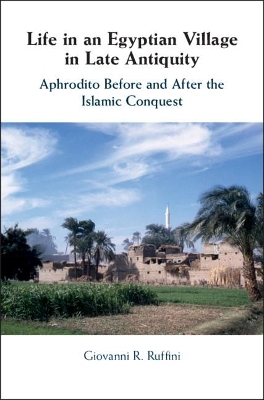
Life in an Egyptian Village in Late Antiquity
Aphrodito Before and After the Islamic Conquest
Seiten
2018
Cambridge University Press (Verlag)
978-1-107-10560-7 (ISBN)
Cambridge University Press (Verlag)
978-1-107-10560-7 (ISBN)
Explores the records from Aphrodito, a late Roman village, and provides a micro-history, giving more detail about daily life here than anywhere else in the Roman Empire. Challenges the conventional focus on late antique cultural elites. Creates instead a vision of Late Antiquity focused on free peasants and their villages.
Most ancient history focuses on the urban elite. Papyrology explores the daily lives of the more typical men and women in antiquity. Aphrodito, a village in sixth-century AD Egypt, is antiquity's best source for micro-level social history. The archive of Dioskoros of Aphrodito introduces thousands of people living the normal business of their lives: loans, rent contracts, work agreements, marriage, divorce. In exceptional cases, the papyri show raw conflict: theft, plunder, murder. Throughout, Dioskoros struggles to keep his family in power in Aphrodito, and to keep Aphrodito independent from the local tax collectors. The emerging picture is a different vision of Roman late antiquity than what we see from the view of the urban elites. It is a world of free peasants building networks of trust largely beyond the reach of the state. Aphrodito's eighth-century AD papyri show that this world dies in the early years of Islamic rule.
Most ancient history focuses on the urban elite. Papyrology explores the daily lives of the more typical men and women in antiquity. Aphrodito, a village in sixth-century AD Egypt, is antiquity's best source for micro-level social history. The archive of Dioskoros of Aphrodito introduces thousands of people living the normal business of their lives: loans, rent contracts, work agreements, marriage, divorce. In exceptional cases, the papyri show raw conflict: theft, plunder, murder. Throughout, Dioskoros struggles to keep his family in power in Aphrodito, and to keep Aphrodito independent from the local tax collectors. The emerging picture is a different vision of Roman late antiquity than what we see from the view of the urban elites. It is a world of free peasants building networks of trust largely beyond the reach of the state. Aphrodito's eighth-century AD papyri show that this world dies in the early years of Islamic rule.
Giovanni R. Ruffini is a Professor in the Department of History at Fairfield University, Connecticut. He is the co-founder and editor of Dotawo: A Journal of Nubian Studies and is the author of numerous articles and several books on Byzantine Egypt and medieval Nubia. These books include Social Networks in Byzantine Egypt (Cambridge, 2008) and Medieval Nubia: A Social and Economic History (2012).
1. Aphrodito in Egypt; 2. A world of violence; 3. A world of law; 4. Dioskoros, caught in between; 5. Working in the fields; 6. Town crafts and trades; 7. Looking to heaven; 8. From cradle to grave; 9. Aphrodito's women; 10. Big men and strangers; 11. Life in the big city; 12. Conclusion.
| Erscheinungsdatum | 17.10.2018 |
|---|---|
| Verlagsort | Cambridge |
| Sprache | englisch |
| Maße | 157 x 235 mm |
| Gewicht | 490 g |
| Themenwelt | Geschichte ► Allgemeine Geschichte ► Vor- und Frühgeschichte |
| Geschichte ► Allgemeine Geschichte ► Altertum / Antike | |
| Geschichte ► Allgemeine Geschichte ► Mittelalter | |
| Geisteswissenschaften ► Geschichte ► Regional- / Ländergeschichte | |
| Geschichte ► Teilgebiete der Geschichte ► Kulturgeschichte | |
| Sozialwissenschaften ► Soziologie ► Allgemeines / Lexika | |
| ISBN-10 | 1-107-10560-9 / 1107105609 |
| ISBN-13 | 978-1-107-10560-7 / 9781107105607 |
| Zustand | Neuware |
| Haben Sie eine Frage zum Produkt? |
Mehr entdecken
aus dem Bereich
aus dem Bereich
auf den Spuren der frühen Zivilisationen
Buch | Hardcover (2023)
C.H.Beck (Verlag)
20,00 €
Was Pompeji über uns erzählt
Buch | Hardcover (2023)
Propyläen (Verlag)
32,00 €


